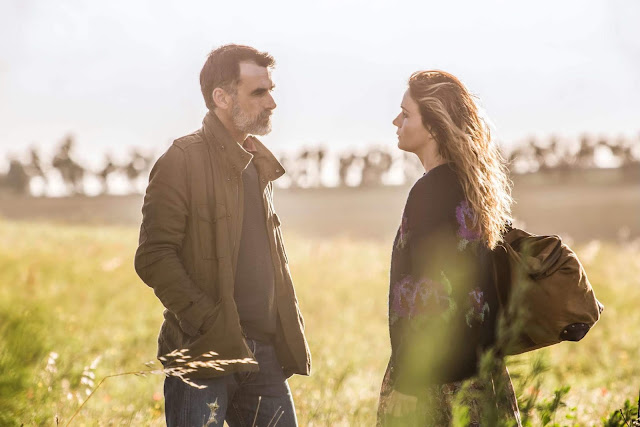Actress Lucia Mascino presented Francesca Comencini’s "Stories of Love that Cannot Belong to This World" at the 18th edition of the Film Society of Lincoln Center's Open Roads: New Italian Cinema.
Adapted from Comencini's book, the film offers an intimate look at how one woman deals with the end of a relationship. Although many would not have the same seemingly desperate reaction, it's the delusional or even hopeful motivation for which she stayed that we can all understand on some level.
The film follows Claudia (Lucia Mascino) and Flavio (Thomas Trabacchi), two very different people but deeply in love nonetheless. Their tumultuous, passionate relationship is driven by powerful feelings, but they are simply not good for each other. Their sincere love, affection and attraction keep them emotionally and physically attached and unable to leave even though they often argue. However, an indifferent comment made by Claudia is Flavio's last straw and he finally breaks away. The film is a series of flashbacks woven with moments in the present. There are surprises and unexpected twists. At times, it gets frustrating to watch Claudia’s desperation and codependency, but it’s worth staying in the trenches to witness her gratifying revelation at the end.
Mascino’s performance is exceptional and she has received numerous praises and awards for the interpretation of her character. Claudia’s emotional rollercoaster takes her to extreme highs and lows. Although Claudia has an eccentric personality, she is relatable because there are many layers to her. You will not identify with all of them, but as Mascino reveals the complexities and idiosyncrasies of her character, you will find common ground.
I spoke with Mascino while she was in New York promoting the film. She talked about her affection for this character and her joy in working with Comencini.
Tell me about your character in this film.
The film tells the story of a character that in my opinion, many women can relate to. This character named Claudia is a university professor, but beyond the craft has an emotional temperament. In my opinion, her temperament can be characterized as great passion, great sentimental generosity and therefore also has a great commitment to those close to her. She is an exaggerated, tumultuous woman who is dealing with a huge emotional break. There is a story of separation from a great love. However, the beautiful thing about this film is that it tells something positive because it’s a story of how we transform ourselves as we bring our life back into our own hands after giving it to another person. It is a film about rebirth and this character embodies all the feelings from the most funny to the more dramatic during this emotional evolution. I really like this character.
How did you prepare for this role? For example, did you reach inside yourself to understand how you related to Claudia?
When I read the script, I liked it so much and I thought I did not want to make a character built from the outside. I wanted to approach it slowly. There were many months before shooting because I had received the screenplay in November and we shot the film in May. So during those five months, I would think of one phrase from the movie rather than thinking about the whole movie. For instance, while I was taking a shower, a sentence would come to mind and I’d then have an understanding of that phrase. I tried to approach the character in this way, slowly, because I felt it was the best way to honor and approach a true story.
What was it like working with Francesca Comencini. How did your collaboration come about?
We did not know each other when she asked me to audition but we wanted to give it a try. She told me to throw myself into the character and to exaggerate, not to be afraid in the audition. So I did what she said and I found out immediately after the audition that I had been chosen for the part. I was very happy to work with Francesca because I had seen her films. In particular, I had seen "Un spazio bianco" (The White Space) with Margherita Buy. That was a wonderful film. I would have never imagined doing a movie with her because she is a director that I knew but she did not know me. How was it to work with her? Let's say this collaboration allowed us to work well together. The story is also a bit of her own story even though she wrote the screenplay with two other writers, and so there was a delicate situation. It was easy for me to work with Francesca because in a way, we are similar, and she loves actors very much. She always said, ‘My beloved actors!’ And this is important.
"Stories of Love that Cannot Belong to This World" is still being shown at film festivals throughout the world. We'll keep you updated on distribution in North America. In the meantime, you can watch Lucia Mascino opposite Christian De Sica in Caterina Carone's Storm Warning (Fraulein- Una Fiaba d'Inverno), which is available to stream on Amazon.
- Jeannine Guilyard


Comments
Post a Comment